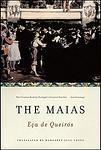Eça de Queirós
José Maria de Eça de Queirós, commonly known as Eça de Queirós, was a prominent Portuguese writer of the 19th century, considered one of the greatest novelists in the Portuguese language. He was born on November 25, 1845, in Póvoa de Varzim, Portugal, and died on August 16, 1900. Eça de Queirós was a leading figure in the Portuguese literary movement known as Realism. His works often critiqued the social and moral standards of his time, and he is best known for novels such as 'The Crime of Father Amaro' ('O Crime do Padre Amaro'), 'The Maias' ('Os Maias'), and 'The Illustrious House of Ramires' ('A Ilustre Casa de Ramires'). His writing style is characterized by rich detail, intricate plots, and deep psychological insight.
Books
This list of books are ONLY the books that have been ranked on the lists that are aggregated on this site. This is not a comprehensive list of all books by this author.
-
1. The Maias: Episodes from Romantic Life
"The Maias: Episodes from Romantic Life" is a compelling narrative set in Lisbon in the late 19th century that follows the lives of a wealthy Portuguese family, the Maias. The story centers around the romantic and professional life of Carlos Maia, but also includes a rich cast of secondary characters. The plot includes themes of love, betrayal, disillusionment, and tragedy, all set against the backdrop of a rapidly changing Portuguese society. The novel is also a critique of the decadence and stagnation of Portuguese society at the time.
-
2. The Crime of Father Amaro
Set in 19th century Portugal, this novel follows the life of a young priest, Father Amaro, who is posted in a provincial parish. Despite his religious vows, he falls in love with a beautiful girl, Amelia, who is also the daughter of his landlady. Their forbidden love affair results in Amelia's pregnancy, leading to tragic consequences. The novel vividly portrays the corruption within the Catholic Church and the hypocrisy of the society.
-
3. The Illustrious House of Ramires
The book follows the story of a young aristocrat from an ancient and noble family who is trying to write a historical novel about his heroic ancestors. However, he struggles with this task as he is constantly distracted by the mundane and frivolous happenings of his modern life. This satirical novel explores themes of national identity, history, and the contrast between the past and the present, all while providing a critique of 19th-century Portuguese society.


